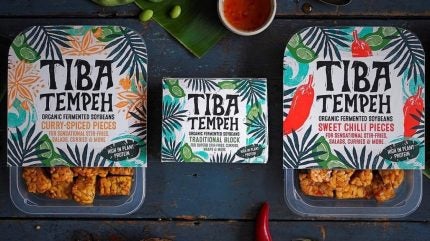
Tiba Tempeh, a UK plant-based start-up taking its name from an Asian fermented protein, is chasing a market potentially worth GBP10m (US$13.6m).
Set up in 2019 by husband-and-wife team Alex and Ross Longton, who met 13 years ago while working in sales at Kraft Heinz, Tiba Tempeh has secured GBP500,000 in seed funding from Lever VC, an investment fund focused on alternative protein. The couple discovered tempeh on a trip to Indonesia and were impressed by its protein qualities and the benefits to gut health from the fermented beans.

Discover B2B Marketing That Performs
Combine business intelligence and editorial excellence to reach engaged professionals across 36 leading media platforms.
Located in Newcastle Upon Tyne, Tiba Tempeh is not trying to mimic an alternative to meat but seeks to offer consumers a superior protein source, which is twice that of tofu, Mrs Longton tells Just Food. The business, which plans to enter major UK retailers in 2022, has tripled revenues each year since its founding, she said, declining to provide actual numbers or targets.
While the UK market for tempeh is small in value terms compared to tofu, it is growing much faster.
“Tofu is worth GBP20m in the UK right now and it’s growing 30%. Tempeh is currently worth GBP3m, a very small proportion of tofu but, it does have significant potential because it’s also growing 112% year on year,” Mrs Longton explains. “We’ll be making Tempeh a GBP10m category over the next two years.”
The couple set up Tiba Tempeh with their own funds and its Sweet Chilli, Curry Spiced and Soy Marinade pieces are available in Planet Organic, Whole Foods Market and health retailer Holland & Barrett, as well as online at Ocado. It also has a limited presence in foodservice – restaurants and pubs – and is in Mindful Chef recipe boxes, the UK meal-kit supplier.

US Tariffs are shifting - will you react or anticipate?
Don’t let policy changes catch you off guard. Stay proactive with real-time data and expert analysis.
By GlobalDataMrs Longton said Tiba Tempeh has “got pretty big major customers interested” and lined up for this year, declining to provide names of the retailers. And for its tempeh burger, “we’ve got a bigger pub chain launching” in April.
Tempe is minimally processed and has a similar protein content to compete with meat. Compared to tofu, which is made from soy milk extracted from soya, it uses the whole bean fermented into a block, she said.
“There are lots of lots of reasons why tempeh will become a very popular meat- alternative. It’s got 25 grams of protein, which is pretty much the same as meat without having to be lab processed,” she said. “The key message for us is that it’s tasty and packed with protein.”
Tempe’s high protein content would make it a viable plant-based alternative to meat. In the UK, the meat-free market stood as US$712.5m in 2021, and has grown at a compound annual growth rate of 7.3% over the last five years, according to figures compiled by London-based GlobalData.
The UK is the largest market for meat substitutes in Europe ahead of Germany. Retail sales in the region, including the UK, reached $2.6bn last year, with Germany accounting for $397m.
Tiba Tempeh employs five people but is seeking to take on more as the business expands, including an innovation and operations manager soon. As well as the UK, the business has a “few” international customers, mainly in Europe, Mrs Longton confirmed, adding the company may eye markets further afield, perhaps next year.
The firm uses a co-manufacturer, which has been producing tofu for 30 years or so, the co-founder said, noting the partner has a “lot of capacity” to enable the business “to scale really quickly”.
Mrs Longton said health is the key reason consumers are turning to plant-based foods, putting the percentage in the UK at 61%. And environmental concerns are another reason. But she emphasises Tiba Tempeh is not trying to replicate the meat experience.
“Tempeh doesn’t have to taste like meat, we don’t try to taste like meat and we don’t try to process it like meat.”




